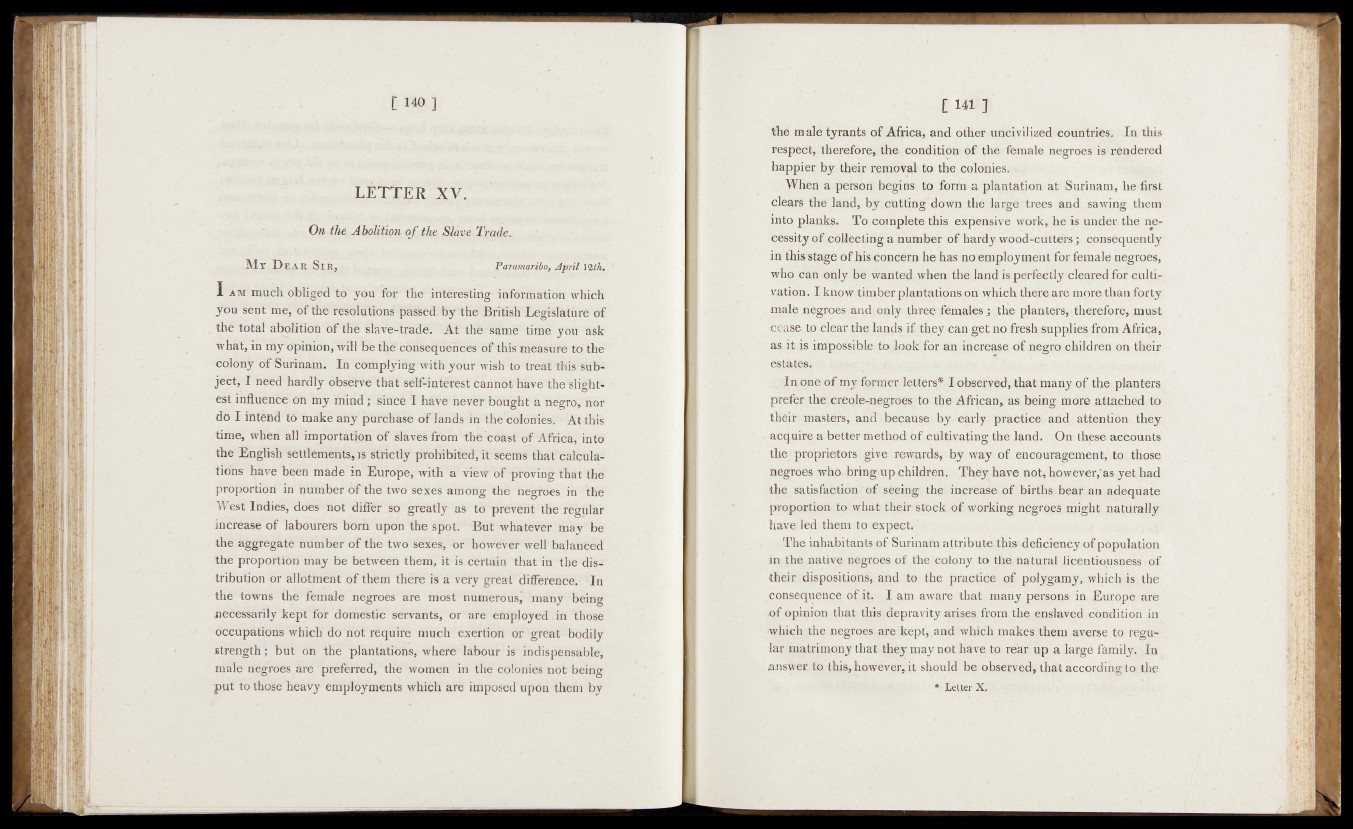
L E T T ER X V .
On the Abolition o f the Slave Trade.
M r D ear Sir , - . Paramaribo, Ap ril
I a m much obliged to" you for the interesting inforrhation which
you sent me, of the resolutions passed, by the British’Legislature of
thé total abolitioh bf the slhve-trade. .At thesahae time ybü ask
what, in ittiy opinion, will be the consequences of this measüré fo the
colony Of "Surinam. ïn complying with your wish to treat this stfb-
jéctj I need hardly observe that self-interest cannot have the slightest
influence on my mind; sincé I have never bought a negro,- rior
do I intend to make any purchase of lands in the colonies;'1 At this
time, when all importation of slaves from the‘coast of Africa, into
the English settlements, rs strictly prohibited, it seems that1 calculations
have been made in Europe, with a view of proving that the
proportion in number Of the two sexeö among thé hegróes iC thé
West Indies, doies not differ so greatly as to prevent the regular
increase of labourers bom upon the spot. But whatever may 'be
the aggregate number of the two' sexes, or however'well balanced
the proportion may be between them, it is certain that in the distribution
or allotment of them there is a very great difference.- -In
the towns the female negroes are most numerous^ many being
necessarily kept for domestic servants, or are employed.in those
occupations which do not require much exertion or great-bodily
strength; but on the plantations, where labouf * is indispensable,
male negroes are preferred, the women in the colonies not being
put to those heavy employments which are imposed upon them by
the male tyrants of Africa, and other uncivilized countries. In this
respect, therefore, the.. condition of the female negroes is rendered
happier by their removal to the Colonies. *;
When a person-begins to form a plantation at‘ Surinam, he first
clears the land, by cutting'down the large trees and sawing them
into planks. To.complete this expensive work, he is under the necessity
of-collecting a number of hardy wood-cutters; consequently
in this stage of his concern he has no employment for female negroes,
who can only be wanted when the land is perfectly cleared for cultivation.
I know timber plantations on which there are-more than forty
male negroes and- only three females; the planters, therefore, must
cease to clear the lands if they can get no fresh supplies.from Africa,
as it is impossible to look for an increase of negro children on their
estates.-
. J n one of my former letters^ I observed, that many of the planters
prefer the^cijeole-negress; to the African, as being more attached to
their masters, and-because'by early practice and attention they
acquire a better method of cultivating the land. On ihpse accounts
the proprietors give rewards, by way of encouragement, to those
negroes wbo bring up children. They have not, however, as -yet had
the satisfaction- of seeing the increase of births.bear.an adequate
proportion to what their stock of working negroes might- naturally
have. led. them to expect.
The inhabitants of Surinam attribute this, deficiency of population
in the native negroes of the colony to the natural licentiousness of
their dispositions, and to the practice, of polygamy, which is the
consequence of am aware that many persons in Europe are
of opinion that this depravity arises from the enslaved condition in
which the negroes are kept,,and which makes:them averse to regular
matrimony that they may not have to rear up a large family..In
answer, to this, however, it should be observed, that according to the
*-Letter Xi/i -i